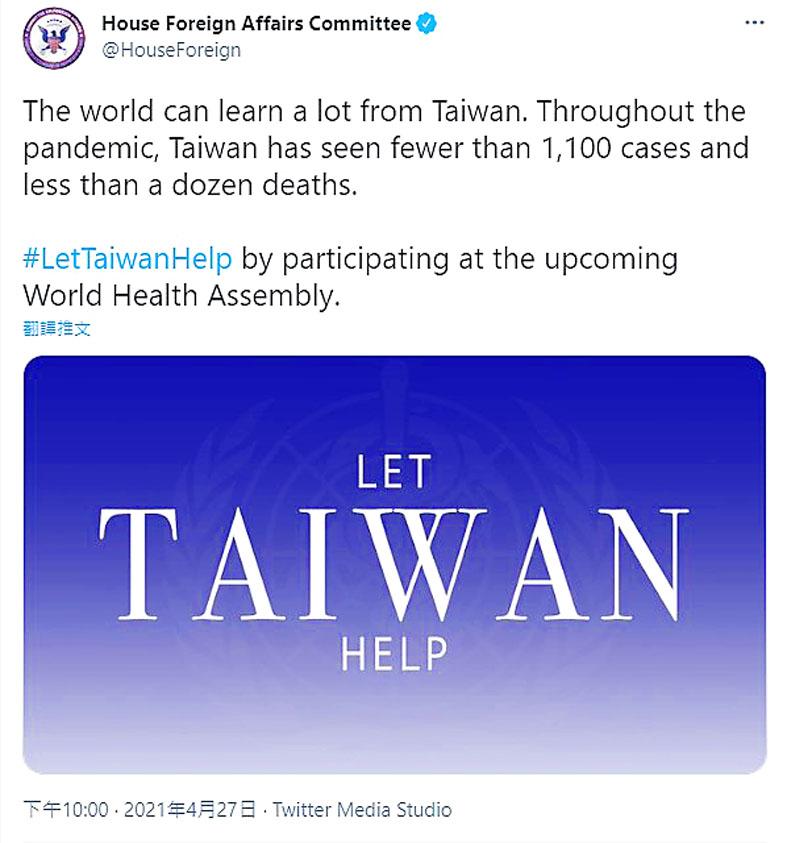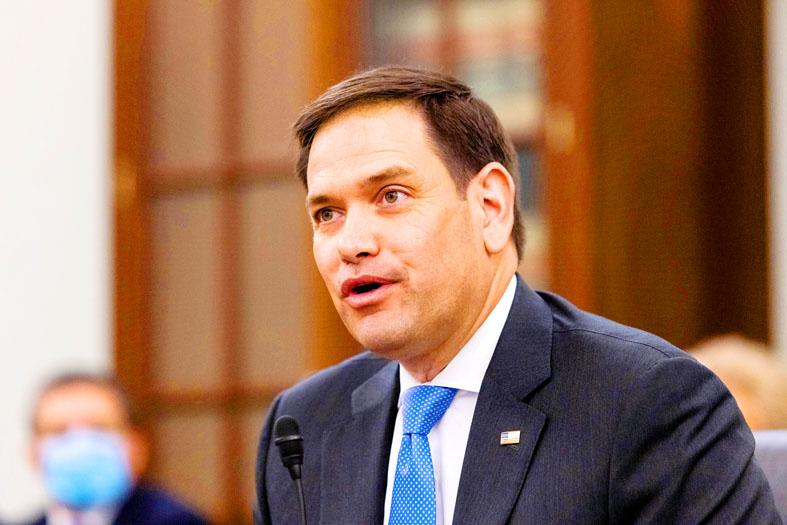Lawmakers and world leaders on Tuesday joined a campaign using the hashtag #LetTaiwanHelp, calling for the nation’s participation in next month’s World Health Assembly (WHA).
The Inter-Parliamentary Alliance on China (IPAC) launched the initiative with a video on Twitter featuring 15 lawmakers from 12 legislatures across Australia, Europe, New Zealand and North America.
The US Senate and House of Representatives committees on foreign affairs joined the alliance in spearheading the 48-hour campaign, which started at 10pm on Tuesday, Taiwan time.

Photo: Screen grab from Twitter
The WHA, the decisionmaking body of the WHO, is to hold its 74th annual meeting virtually from Geneva, Switzerland, from May 24 to June 1.
In the IPAC video, the lawmakers praised Taiwan’s response to the COVID-19 pandemic, its donations of medical equipment and its support for global health initiatives.
Despite this, Beijing has continued to “politicize” global health by blocking Taiwan’s participation in the WHA, creating a “dangerous gap” in global health, while also depriving the world of Taiwan’s medical expertise, they said.

Photo: Reuters
“If Taiwan is left out, we all suffer. It’s time to #LetTaiwanHelp,” the group said, urging others to join the campaign by sharing the hashtag.
In a statement released by IPAC, French Senator Andre Gattolin said that Taiwan’s participation in the WHA “should not even be questioned,” given its vital role in the international community and assistance to other nations during the COVID-19 pandemic.
British lawmaker Iain Duncan Smith said that Beijing’s actions to “politicize global health” were “unacceptable,” and called on “the UK and the free world” to do more to support Taiwan on the international stage.
Lawmakers in the video included US Representative Ami Berra, chair of the House Subcommittee on Asia, the Pacific, Central Asia and Nonproliferation; US Senator Marco Rubio; Duncan Smith; and Australian Senator Kimberly Kitching.
The campaign received support from officials worldwide.
The majority of posts came from US lawmakers, who flooded social media with the hashtag.
US senators Bob Menendez and Jim Inhofe urged their colleagues to pass a bill they reintroduced last month that would instruct the US Department of State to assist Taiwan in obtaining observer status at the WHA.
Czech Senator Pavel Fischer shared a resolution that would call on the Czech government to “challenge the WHO deadlock and allow Taiwan to take part” in the WHA.
Some of the nation’s diplomatic allies also lent their voices, including the leaders of Saint Vincent and the Grenadines, and Saint Kitts and Nevis.
The Ministry of Foreign Affairs yesterday thanked the participants for their “avalanche of support.”
“Our gratitude to friends from democracies worldwide for recognizing #TaiwanCanHelp realize #HealthForAll,” it wrote on Twitter, using the WHO’s slogan.
In a separate statement it praised the “creative” collaboration that saw unprecedented participation from national leaders and representatives.
The campaign “demonstrates that Taiwan’s inclusion in the global health system is the consensus of most democratic nations,” it said, calling on the WHO to extend it an invitation to the WHA.

RESPONSE: The transit sends a message that China’s alignment with other countries would not deter the West from defending freedom of navigation, an academic said Canadian frigate the Ville de Quebec and Australian guided-missile destroyer the Brisbane transited the Taiwan Strait yesterday morning, the first time the two nations have conducted a joint freedom of navigation operation. The Canadian and Australian militaries did not immediately respond to requests for comment. The Ministry of National Defense declined to confirm the passage, saying only that Taiwan’s armed forces had deployed surveillance and reconnaissance assets, along with warships and combat aircraft, to safeguard security across the Strait. The two vessels were observed transiting northward along the eastern side of the Taiwan Strait’s median line, with Japan being their most likely destination,

GLOBAL ISSUE: If China annexes Taiwan, ‘it will not stop its expansion there, as it only becomes stronger and has more force to expand further,’ the president said China’s military and diplomatic expansion is not a sole issue for Taiwan, but one that risks world peace, President William Lai (賴清德) said yesterday, adding that Taiwan would stand with the alliance of democratic countries to preserve peace through deterrence. Lai made the remark in an exclusive interview with the Chinese-language Liberty Times (sister paper of the Taipei Times). “China is strategically pushing forward to change the international order,” Lai said, adding that China established the Asia Infrastructure Investment Bank, launched the Belt and Road Initiative, and pushed for yuan internationalization, because it wants to replace the democratic rules-based international

The National Development Council (NDC) yesterday unveiled details of new regulations that ease restrictions on foreigners working or living in Taiwan, as part of a bid to attract skilled workers from abroad. The regulations, which could go into effect in the first quarter of next year, stem from amendments to the Act for the Recruitment and Employment of Foreign Professionals (外國專業人才延攬及僱用法) passed by lawmakers on Aug. 29. Students categorized as “overseas compatriots” would be allowed to stay and work in Taiwan in the two years after their graduation without obtaining additional permits, doing away with the evaluation process that is currently required,

RELEASED: Ko emerged from a courthouse before about 700 supporters, describing his year in custody as a period of ‘suffering’ and vowed to ‘not surrender’ Former Taiwan People’s Party (TPP) chairman Ko Wen-je (柯文哲) was released on NT$70 million (US$2.29 million) bail yesterday, bringing an end to his year-long incommunicado detention as he awaits trial on corruption charges. Under the conditions set by the Taipei District Court on Friday, Ko must remain at a registered address, wear a GPS-enabled ankle monitor and is prohibited from leaving the country. He is also barred from contacting codefendants or witnesses. After Ko’s wife, Peggy Chen (陳佩琪), posted bail, Ko was transported from the Taipei Detention Center to the Taipei District Court at 12:20pm, where he was fitted with the tracking